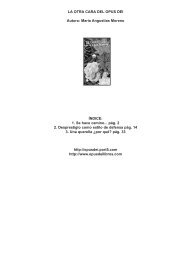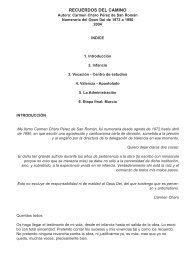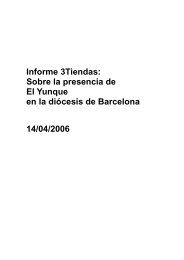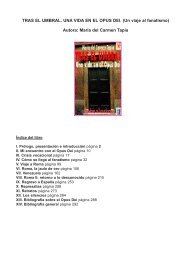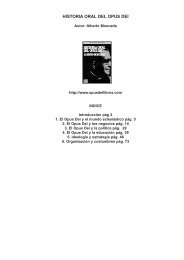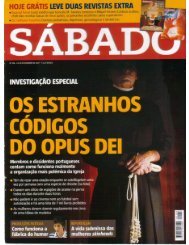inside, the faithful find themselves gradually burdened with obligations and a way of life which havelittle or nothing to do with the charism approved by the Church. The end of the Prelature is the vagueand ethereal formula always invoked to violate the rights of the person. Furthermore, it is hammeredon the faithful that, if they were to abandon this ecclesial path, they would run the risk of eternaldamnation.Many soon feel themselves cheated because, sincerely seeking to serve God according to an entirelylay spirituality, they are then forced into a completely different lifestyle in the name of the will of God.To this must be added their being indoctrinated —as a grave moral duty— into the lie of an unboundedobedience which lacks any clear and stable canonical legal framework. Both men and women have tosuffer grave abuses of their fundamental rights, rights protected by the universal canons of the Church.Since they do not respect a stable legal framework, the “internal norms” of the Prelature, neverapproved by the Holy See, demand from its members many obligations not envisioned in the Estatutos(Statutes). Obligations which enlarge —“at the whim” of the Directors— the substantial content andthe ways of one’s dedication. In many cases this does not directly violate universal Canon Law, butit amounts to a “fraud” with respect to the vocational ideal initially proposed to and wanted by thefaithful.The constant emanation of “norms” or criteria, through internal writings and notes, keeps permanentlychanging the contents of one’s “commitment” at the whim of the Directors. And this long listof “obligations,” presented as a direct demand of the Divine Will, or as a concrete manifestation of thefidelity to that Will, oppresses the hearts of the faithful and ends up warping their perception of reality.There are too many contradictions and too many lies in the pastoral activities of the Work: from theformation received —limited on purpose, partial, unilateral, and even cult-like— to the informationgiven about the true historical reality, vital and juridical, of the institution.All this is done by an organization that persuades itself of fulfilling the will of God, in a secureand unquestioned union with Him. A union that informs all its actions with the seal of goodness andorthodoxy. It believes to have within itself the solution to the terrible problems of the Church. It alsobelieves to have in its bosom fidelity to the true doctrine, questioned by a new generation of restlesstheologians not sufficiently repressed by weak, disoriented Pontiffs. She onmia bene fecit and, “holier”than the Church herself, has no need to ask for any pardon.<strong>Opus</strong> <strong>Dei</strong> needs to improve the moral uprightness of its actions and its transparency. This willrequire a task of historical clarification about the person of its Founder, its charism, and the practicalapplication of its particular Law in agreement with the universal Law of the Church. As long as all thisremains unfulfilled, it will continue to be an institution without effective communion with the pastoralaction and the Hierarchy of the Church. It will remain a group of people that go their own way, a“cancer” that spreads “inside” the Church, carrying the seeds of scandals, tensions, and divisions.The Divine Teacher came to witness to the truth (Ioh 18:37). It is deeply inconsistent for aninstitution of the Church to live with lies and opacity. It is disastrous for the institution and a timebomb for the Church. Any society seeking to grow in real goodness must be capable of constant reform,of purification. And this cannot be achieved without a holy self-criticism. Commitment to the truth isalways the mark of authentic faith distinguishing it from human fanaticisms.6 The Needed Intervention of the Holy See20. There is a whole “official literature” about the Founder and the history of <strong>Opus</strong> <strong>Dei</strong> that admitsno criticism and that, little by little, has been shown false in many aspects. This is not the place topresent the existing proofs. But it is worth pointing out that the historical sources about the Founderand <strong>Opus</strong> <strong>Dei</strong> have been sequestered by its Directors, with a total control over that information, andeven over any literary production, which requires the explicit authorization of the Directors.Most of the Foundational Cartas (Letters) have been removed from internal use and circulation.The “official” biographies of the Founder and his Work contain unacceptable gaps about highly contestedaspects of his life or provide facts and interpretations that have later been shown to be false. Generallyspeaking, a free and independent historical research at the service of truth is not promoted or facilitated.All this is a tangle of half truths and false appearances, clearly institutionally promoted propaganda.These lies to the Holy See and to the faithful, justified as a defense of the charism, tend to originate inan incoherent expression of such a charism in the praxis and law of <strong>Opus</strong> <strong>Dei</strong>.As it has already been shown, the internal pastoral action of <strong>Opus</strong> <strong>Dei</strong> contains grave moral errors15
that, to bring the institution in full communion with the doctrine and the discipline of the Church, willrequire an in-depth revision. This must begin with an internal and external debate at the service of truth,overcoming the terror —shown in fact by some— of finding theological, canonical, and anthropologicalflaws, or plain errors and inconsistencies, in the writings of the Founder.It is ecclesiastically inadmissible that the “sequestration” of the historical sources of the institution,with the purpose of protecting its image at any price, should be allowed to go on any longer. Thisappropriation of the foundational writings by the Directors puts in evidence the shaky foundations onwhich the current praxis of <strong>Opus</strong> <strong>Dei</strong> is based. No criticism is allowed, because it could easily bringdown the entire edifice. By not acknowledging or facing its deep crisis, the Prelature is kept fromcollapse by means of a fanatical indoctrination and a totalitarian control over consciences, which areperpetrated in the name of God and His Church. Such indoctrination and control are accepted in a“brainless” way, due to the naive and ignorant trust and good will of many of the members.The Prelate and his team of collaborators do not seem to be capable of carrying out this selfcriticism;because they have directly caused the current situation, and there is data supporting theclaim that they act in this way with full awareness. A serious discussion of the deeper issues is replacedby appropriate “image” or public relations campaigns. Thus, <strong>Opus</strong> <strong>Dei</strong> spends enormous efforts tomaintain its external image. For example, just in the Region of Spain there are more than 50 peoplededicated full-time to media relations. This is in addition to the Directors —who also work on suchtasks— and the faithful of <strong>Opus</strong> <strong>Dei</strong> who work in the mass media.The effect of all this on persons is an issue whose confrontation cannot be delayed. Abuses of thekind here exposed cannot be tolerated. Even less when they are perpetrated in the name of God. Thisdispleases the Holy Spirit, who guides the Church, but only when there is communion with Christ, whichis communion with the Church. The following questions must be faced: is what has been describedsomething really approved by the Holy See as part of the charism of <strong>Opus</strong> <strong>Dei</strong>? Has the PersonalPrelature been erected to provide an “independent cover” to this way of acting outside the scope of theBishops and the universal canons of the Church?These questions must be answered in the negative. However, many persons in <strong>Opus</strong> <strong>Dei</strong> are doinggood and acting in an upright way; and the organization itself could yield excellent apostolic fruits ifthey were not thwarted by the current deviations, which deeply harm its pastoral action. This is morethan enough reason for the Holy See to intervene to help rectify those ways of acting that are opposedto the gift of God. And it is certainly true that such an intervention, if it were to take place, should bepublic and well-known; otherwise it could be watered down in the “sequestered consciences” of manyfaithful of the Prelature.A The “Quemadmodum” Decree of December 17 1890A.1 English translation of the “Quemadmodum” DecreeDECREEby which some norms are dictated pertaining to the intimate manifestationof conscience and the heart to the Superiors in monasteries of women or menIn the same way that it is a condition in human things —no matter how upright and holy— thatmen will use them to end up in what is foreign and improper to them, and this will result in abuses, italso happens with wisely formulated laws. When this happens, the end sought by the legislator is notreached, and sometimes even results in the contrary effect.It is most painful that this would happen with respect to the laws of many Congregations, Societies,or Institutes of women who make simple or solemn vows, or of men who have professed vows, or evenin the government of lay people. Sometimes the manifestation of conscience was permitted in theirConstitutions, with the purpose that beginners would more easily learn from their expert Superiors thearduous path of perfection when they had doubts. It now happens, on the contrary, that some of theseSuperiors have imposed on their subjects this intimate scrutiny of conscience which is solely reservedto the Sacrament of Penance.Likewise, in agreement with the sacred Canons, it was established in Constitutions that, in Communitiesof this kind, sacramental Confessions would be heard by the respective ordinary or extraordinaryConfessors. Aa a result, the whim of the Superiors reached the extreme of denying to their subjects16


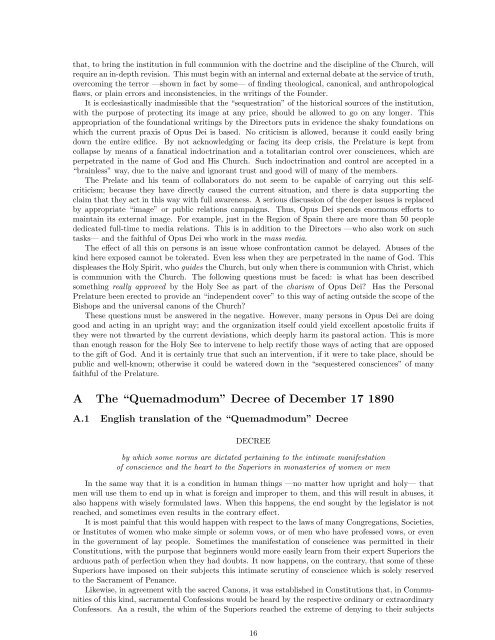
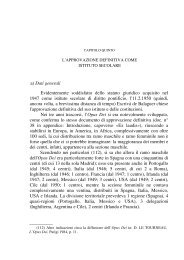
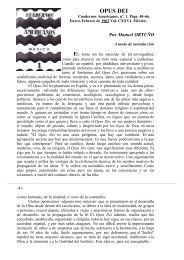
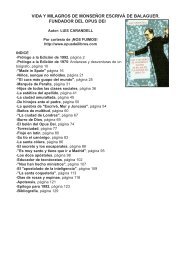
![Opus Dei Anexo A Una Historia [pdf].](https://img.yumpu.com/14295645/1/184x260/opus-dei-anexo-a-una-historia-pdf.jpg?quality=85)
